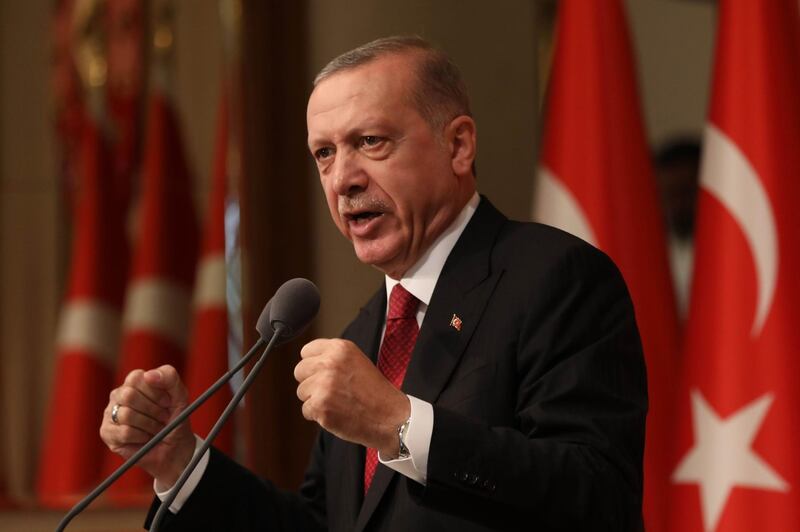With prayers and other events, Turkey on Sunday commemorated the second anniversary of thwarting a coup against the Turkish president and the government that left nearly 290 people dead and hundreds wounded.
President Recep Tayyip Erdogan and top officials attended a Quran recitation in Ankara, kicking off a series of events.
On July 15, 2016, factions within the military used tanks, warplanes and helicopters in an attempt to overthrow Mr Erdogan. Clashes took place in Istanbul, Ankara and Marmaris, where Mr Erdogan was on holiday and reportedly barely escaped capture. Fighter jets bombed parliament and other spots in Turkey's capital.
Turkey has blamed US-based Muslim cleric Fethullah Gulen for being behind the coup attempt, but he rejects the accusation. He was once a close ally to Mr Erdogan, but his network was declared a terror organization after the two had a falling out in 2013.
Ali Erbas, the head of religious affairs, prayed Sunday for the 250 people killed and nearly 2,200 wounded in the coup attempt, saying they stood against "traitors who are the pawns of foreign powers." Mr Erdogan recited verses in Arabic.
________________
Read more:
Two years on, how the coup changed Turkey as we know it
[ Turkey elections: Recep Tayyip Erdogan wins, but what lies ahead for the country? ]
Beyond the Headlines podcast: Turkey's future under an empowered Erdogan
________________
At a luncheon for the families of coup victims and the wounded, Mr Erdogan promised they would never be forgotten. He said Turkish children must be educated about this key date in their nation's history to prevent other coups.
"Each child who does not know their religion, nation, language, homeland or state is the potential target of terror organisation," Mr Erdogan said.
At least 35 alleged coup plotters were also killed.
Since the failed coup, over 75,000 people have been arrested and 130,000 civil servants have been dismissed from their jobs for alleged coup ties. Among them are judges, prosecutors, police and military officers, teachers and academics. Many have protested their innocence.
Critics say the government purge has been arbitrary and used to crackdown on all dissent. Lawmakers, journalists and political activists are among those behind bars.
According to the state-run Anadolu news agency, nearly 2,400 people have been convicted for links to the coup attempt and 1,624 have received life sentences. More cases are pending.
In the past two years, Mr Erdogan has tightened his grip on power through a state of emergency and elections. With a referendum last year and early presidential and parliamentary elections in June, Mr Erdogan has transformed Turkey's ruling system into an executive presidency with limited checks and balances.
He says the defeat of the coup and his election win are testaments to Turkey's democracy.
On Sunday, the presidency issued seven new decrees revamping the government. The new system, having abolished the post of the prime minister, ties all state institutions to the president.
Mosques across the country are holding prayers and events Sunday to mark the day.
US State Department spokeswoman Heather Nauert said in the statement the United States stood by its NATO ally. She called the coup attempt "an attack on democracy and a stark reminder that the preservation of democracy requires perseverance and safeguards for fundamental freedoms."
Turkey has demanded that Washington extradite Mr Gulen, who lives in Pennsylvania.






